WOMEN IN THE BANGSAMORO
The autonomy laws and representation, participation and protection of women in the Bangsamoro
by Carolyn O. Argullas
Republic Act 11054 or the Organic Law for the Bangsamoro Autonomous Region in Muslim Mindanao mandates representation of women in the Cabinet (“at least one”), in the Council of Elders “that shall advise the Chief Minister on matters of governance” and in “other decision-making and policy-determining bodies.”
The law also provides for one sectoral seat for women in the Bangsamoro Parliament. But more women can participate in the Parliament as party representatives or representatives of parliamentary districts.
Persistent lobbying of women’s groups and other civil society representatives before the Bangsamoro Transition Commission (BTC), the body that drafted the Bangsamoro law from 2013 to 2016 and 2017 to 2019 and in Congress under the Aquino and Duterte administrations, have helped ensure that RA 11054 would have more provisions on representation, participation and protection of women than the two autonomy laws before it.
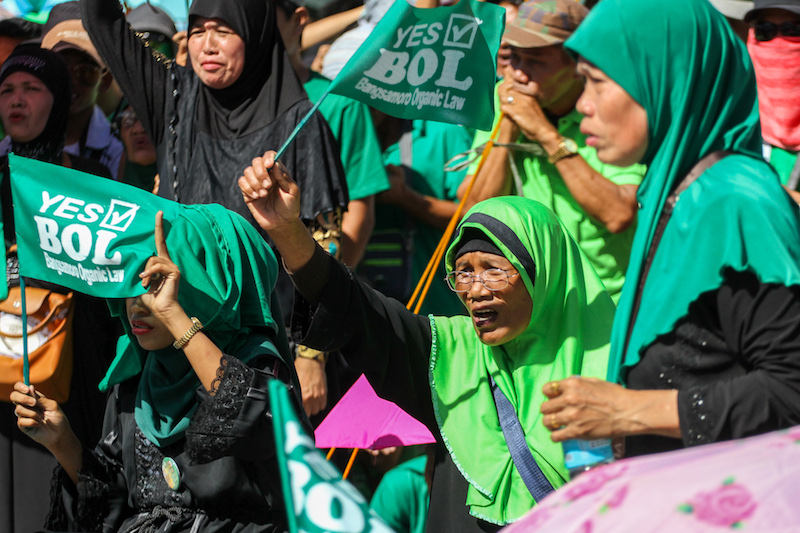 Supporters gather in the compound of the Autonomous Region in Muslim Mindanao (ARMM) in Cotabato City on Monday, 10 Dec. 2018, to formally launch the campaign to vote Yes in the plebiscite on Jan. 21 and Feb. 6, 2019 to ratify RA 11054 or the Organic Law for the Bangsamoro Autonomous Region in Muslim Mindanao. The ratification would pave the way for the creation of the new region that would replace the ARMM. MindaNews photo by MANMAN DEJETO
Supporters gather in the compound of the Autonomous Region in Muslim Mindanao (ARMM) in Cotabato City on Monday, 10 Dec. 2018, to formally launch the campaign to vote Yes in the plebiscite on Jan. 21 and Feb. 6, 2019 to ratify RA 11054 or the Organic Law for the Bangsamoro Autonomous Region in Muslim Mindanao. The ratification would pave the way for the creation of the new region that would replace the ARMM. MindaNews photo by MANMAN DEJETO
In the past 42 years, three autonomous governments of the Bangsamoro have been established – the Regional Autonomous Governments (RAGs) in 1977, the Autonomous Region in Muslim Mindanao (ARMM) in 1990 and the Bangsamoro Autonomous Region in Muslim Mindanao (BARMM) in 2019.
Exercising legislative powers under martial law, President Ferdinand Marcos issued Proclamation1628 on March 25, 1977, declaring autonomy in Southern Philippines, eventually paving the way for the creation of two Regional Autonomous Governments in Western and Central Mindanao. RA 6734 creating the ARMM was passed on August 1, 1989 under President Corazon Aquino and amended by RA 9054 which lapsed into law on March 31, 2001 without President Gloria Macapagal-Arroyo’s signature. The Framework Agreement on the Bangsamoro (FAB) and Comprehensive Agreement on the Bangsamoro (CAB) were signed by government and the Moro Islamic Liberation Front in 2012 and 2014 under President Benigno Aquino but no Bangsamoro law was passed that time. RA 11054 was passed and signed into law by President Rodrigo Duterte on July 27, 2018.
RA 11054 has at least three provisions specifically on women under Article IX on Basic Rights: Section 11 on the “Participation of women in the Bangsamoro Government” and Section 12 on “Protection of Women.” And Gender and Development under Article XIII on Regional Economy and Patrimony.
Sec. 11 provides that aside from the reserved seat for women in the Bangsamoro Government, “there shall be at least one woman to be appointed to the Bangsamoro Cabinet.”
Interim Chief Minister Ahod “Al Haj Murad” Ebrahim has appointed two women in the Cabinet: lawyer Raissa Jajurie as Minister for Social Services and civil engineer Aida Silongan as Minister for Science and Technology.
The same section mandates Parliament to pass a law that
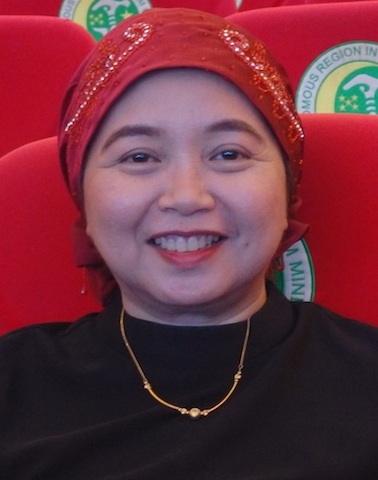 Lawyer Raissa Jajurie, BARMM Minister of Social Services.. MindaNews photo by CAROLYN O. ARGUILLAS
Lawyer Raissa Jajurie, BARMM Minister of Social Services.. MindaNews photo by CAROLYN O. ARGUILLAS
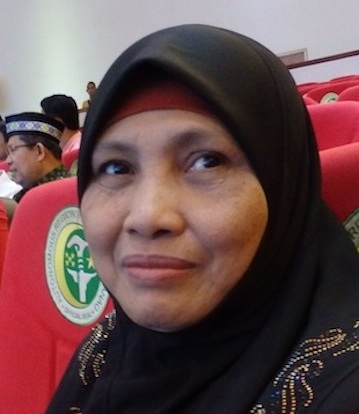 Engineer Adia Silongan, BARMM Minister of Science and Technology . MindaNews photo by CAROLYN O. ARGUILLAS
Engineer Adia Silongan, BARMM Minister of Science and Technology . MindaNews photo by CAROLYN O. ARGUILLAS
gives recognition to the “important role of women in nation-building and regional development, ensuring the representation of women in other decision-making and policy-determining bodies of the Bangsamoro Government” and to create a commission on women.
Section 12 states that the Bangsamoro government shall “uphold and protect the fundamental rights of women, including the right to engage in lawful employment, and to be protected from exploitation, abuse, or discrimination, as embodied in the Convention on the Elimination of all Forms of Discrimination Against Women.”
The Autonomous Region in Muslim Mindanao (ARMM) had earlier set up a Regional Commission on Bangsamoro Women.
Ebrahim appointed Hadja Bainon Karon of the Moro National Liberation Front (MNLF) to head the Commission.
Under the law, the BTA may create offices on youth, women, settler communities, disaster risk reduction and management, and planning and development, among others.
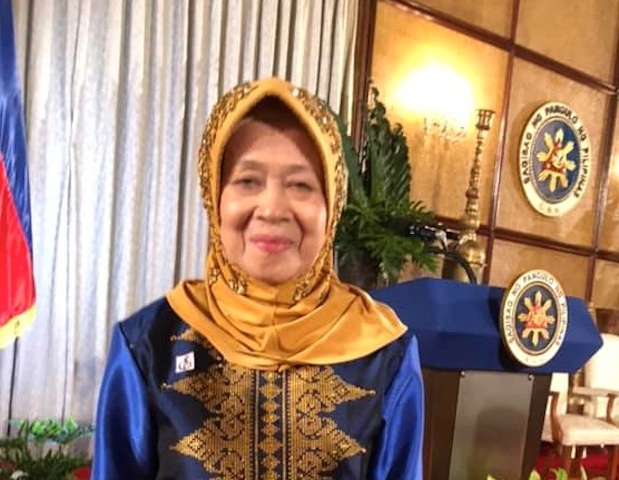 Hadja Bainon Guiabar Karon, Chair, Regional Commission on Bangsamoro Women. Photo courtesy of Rep. Bai Sandra Sema’s FB page
Hadja Bainon Guiabar Karon, Chair, Regional Commission on Bangsamoro Women. Photo courtesy of Rep. Bai Sandra Sema’s FB page
Karon, President of the Federation of United Mindanawan Bangsamoro Women-Multi Purpose Cooperative, co-convenor of Women’s Organizations Movement of Bangsamoro (WOMB) and OIC Vice Governor of the ARMM from December 2011 to June 30, 2013 was nominated to the Bangsamoro Transition Authority (BTA) by the MILF.
Section 5 on Gender and Development under Article XII mandates the Bangsamoro Govenrment to “recognize the role of women in governance and ensure their fundamental equality before the law.”
“It shall guarantee full and direct participation of women in governance and development process, ensuring that women shall benefit equally in the implementation of development programs and projects.”
The Bangsamoro Government is also tasked, under Section 9 (Regional Parties) of Article VII to “ensure the inclusion of women’s agenda and the involvement of women and the youth in the electoral nominating process of the political parties.”
It is also directed to establish a mechanism for consultation with women and local communities “to further ensure the allocation and proper utilization of development funds” and “identify and implement special development programs and laws for women.”
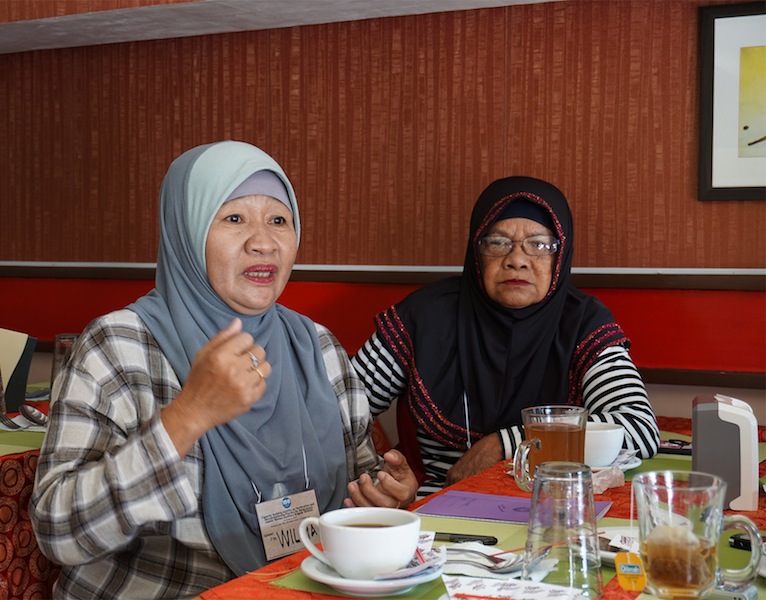 Wilma Madato, 52, and Ling Gumander, 67, leaders of the Bangsamoro Islamic Women’s Auxiliary Brigae. MindaNews photo by GREGORIO BUENO
Wilma Madato, 52, and Ling Gumander, 67, leaders of the Bangsamoro Islamic Women’s Auxiliary Brigae. MindaNews photo by GREGORIO BUENO
In the normalization process, the Bangsamoro Government, with funding support from the National Government, is mandated to “formulate and implement a program for rehabilitation and development that will address the needs of Moro Islamic Liberation Front /Bangsamoro Islamic Armed Force members and its decommissioned women auxiliary force, Moro National Liberation Front/Bangsamoro Armed Forces members, and address the needs of internally displaced persons, widows and orphans, and poverty-stricken communities.”
It is also tasked to “observe, promote, and ensure gender-responsiveness in all aspects of security and peace building, including the participation of women in decision-making.”
Proclamation 1628 for RAGs
Marcos’ Proclamation 1628 declaring autonomy in Southern Philippines made no specific mention of women.
RA 6734 and RA 9054 for ARMM
RA 6734 or the Organic Act creating the Autonomous Region in Muslim Mindanao, had only one provision on women: Section 10 of Article III on Guiding Principles and Policies which provides that the Regional Government “shall uphold and protect the fundamental rights of women and children” and that “in no case shall women and children be exploited, abused or discriminated against.”
RA 9054 included Section 10 of RA 6734 but amended it to read: “The Regional Government shall uphold and protect the fundamental rights of women and children including the right of women to engage in lawful employment.” It also added that “women and children, especially orphans of tender age, shall be protected from exploitation, abuse or discrimination.”
RA 9054 had three more provisions on women.
Section 3 of Article 3 on the Legislative Department, provided for a sectoral representation in the Regional Legislative Assembly.
Section 2C on “Other Legislation” under Article XV on Social Justice, Services, Institutions, and Other Concerns, mandated the RLA to also pass laws on, among others, “Protection and development of the rights of women and of indigenous population.”
Section 6 under Article XV, on women’s rights, said the Regional Government ”recognizes the role of women in nation-building and regional development” and “shall promote their well-being and ensure their fundamental rights and equality with men.”
The same section also states that the Regional Government “shall take appropriate measures against all forms of exploitation of and discrimination against women” and “ensure the representation of women in appropriate decision and policy-making bodies.”
The 1996 Final Peace Agreement between government and the MNL, which was the the basis for RA 9054, mentioned women only once, that there shall be sectoral representatives in the legislative assembly, “among them women.”
The 1976 Tripoli Agreement has no provision specifically on women.
RA 11054 for BARMM
The Framework Agreement on the Bangsamoro (FAB) signed by government and the Moro Islamic Liberation Front (MILF) on October 15, 2012, has a specific provision, under Basic Rights, that guarantees that in addition to basic rights already enjoyed, 12 rights, among them “the right of women to meaningful political participation, and protection from all forms of violence,” are “directly enforceable.”
The FAB, which became part of the Comprehensive Agreement on the Bangsamoro (CAB) that government and the MILF signed on March 27, 2014, was signed in 2012 when more women were involved in the peace panels.
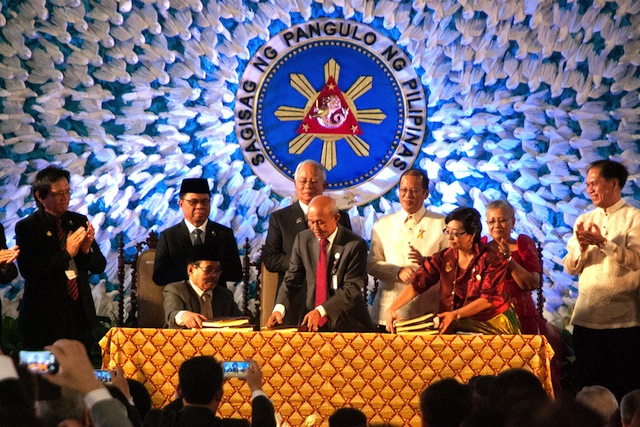 Siging of the Comprehensive Agreement on the Bangsamoro on March 27, 2014 in the gardens of Malacanang. Photo courtesy of Julius Mariveles / Philippine Center for Investigative Journalism
Siging of the Comprehensive Agreement on the Bangsamoro on March 27, 2014 in the gardens of Malacanang. Photo courtesy of Julius Mariveles / Philippine Center for Investigative Journalism
The Presidential Adviser on the Peace Process was Teresita Quintos-Deles, the government peace panel had Miriam Coronel-Ferrer who would take over as chair after the FAB signing, when peace panel chair Mario Victor Leonen was appointed as Associate Justice of the Supreme Court. Several other women were involved, among them the head of the legal team, Johaira Wahab, a Maguindanaon and one of her team members was a Meranaw, Anna Tarhata Basman (now a member of the BTA) who later headed it.
Apparently responding to criticisms that the peace panel it reconstituted was again all-male (it was since 1997), the MILF included women in its peace panel in July 2011 when it named two women advisers: Sulu-born lawyer Raissa Jajurie of the alternative law group, Saligan Mindanaw and Bai Cabaybay Abubakar, President of Shariff Kabunsuan College in Maguindanao. Jajurie eventually became part of the peace panel’s technical working group and served as alternate member.
Jajurie was named member of the Bangsamoro Transition Commission (BTC) that drafted the Baangsamoro law from 2013 to 2016 under the Aquino administration and from 2017 to 2019 under the Duterte administration.
Jajurie is now a member of the BTA and is the BARMM’s Minister of Social Services.
In the BTC from 2013 to 2016, there were four women among15 members with Jajurie the lone nominee from the MILF. The three nominated by government were Wahab, the former head of the legal team of the peace panel, Fatmawati Salapuddin and Froilyn Mendoza, representing the Indigenous Peoples in the Bangsamoro core territory.
Under the Duterte administration, Irene Santiago chaired the government’s Peace Implementing Panel from 2016 to mid-2017 while Diosita Andot served as Executive Director of the Office of the Presidential Adviser on the Peace Process until December 2018.
In the expanded BTC, Duterte named five women out of 21 members, three nominated by the government (Susana Anayatin, Maisara Dandamun-Latiph and Samira Ali Gutoc) and two nominated by the MILF (Ammal Solaiman and Jajurie). Gutoc resigned in late May 2017, in protest of the rape joke made by President Duterte while the Marawi war was raging, the aerial bombings and martial law.
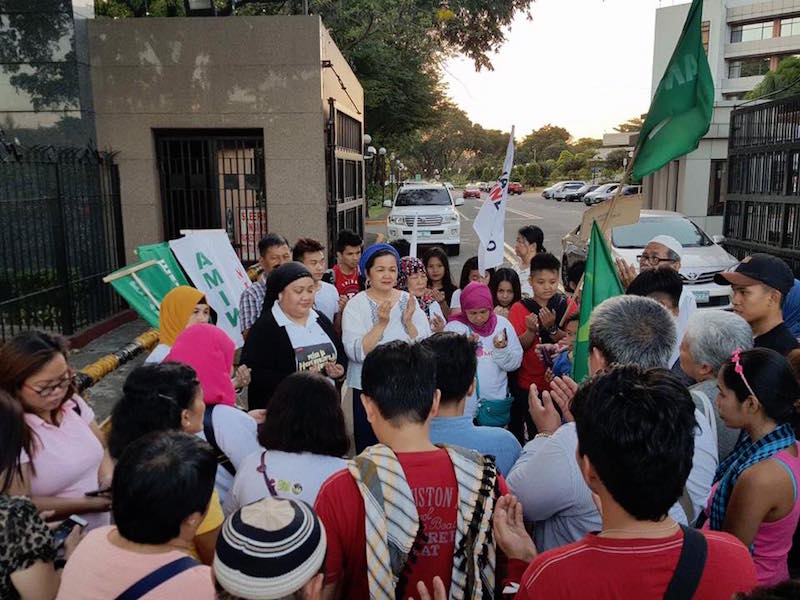 Maguindanao Representative Bai Sandra Sema, Deputy Speaker for Mindanao, and Anak Mindanaw Rep. Amihilda Sangcopan, share what transpired during the Joint Committee hearing on the Bangsamoro Basic Law, with fellow Moro who staged a rally outside the gates of Congress, to push legislators to pass the BBL. Photo courtesy of Rep. Sema’s FB account.
Maguindanao Representative Bai Sandra Sema, Deputy Speaker for Mindanao, and Anak Mindanaw Rep. Amihilda Sangcopan, share what transpired during the Joint Committee hearing on the Bangsamoro Basic Law, with fellow Moro who staged a rally outside the gates of Congress, to push legislators to pass the BBL. Photo courtesy of Rep. Sema’s FB account.
In Congress, women legislators were key players in the passage of RA 11054: in the House, Deputy Speaker for Mindanao Bai Sandra Sema of Maguindanao, Peace Committee chair Ruby Sahali of Tawi-tawi, and Basilan’s Amihilda Sangcopan of Anak Mindanaw; and in the Senate, Senator Risa Hontiveros.
Civil society in the Bangsamoro core territory, in other parts of Mindanao and elsewhere played a major role in pushing for a CAB-compliant Bangsamoro law, conducting information and education campaigns in all levels of society, sending letters to representatives, staging rallies and protest actions. Many of the leaders are women. They are too many to mention individually.
“Most gender-sensitive in the world”
Kristian Herbolzheimer, then Director of the Philippines Programme of the London-based Conciliation Resources, and a member of the International Contact Group (ICG) that accompanied the GPH-MILF peace process, told MindaNews in January 2014 that the Bangsamoro peace process was “one of the most gender-sensitive in the world, with Ferrer, who signed the CAB, as “probably the first ever (woman) chair of a negotiating panel signing a peace agreement” and women “have played a key role also in the MILF team as consultants on legal and political issues.”
He said both panels paid special attention to drafting the multiple documents in gender-responsive language. “This is significant from a gender justice perspective, and also in responding to UN standards,” he said.
The United Nations Security Council’s Resolution 1325 on October 31, 2000 reaffirmed the important role of women in the “prevention and resolution of conflicts, peace negotiations, peace-building, peacekeeping, humanitarian response and in post-conflict reconstruction and stresses the importance of their equal participation and full involvement in all efforts for the maintenance and promotion of peace and security.”
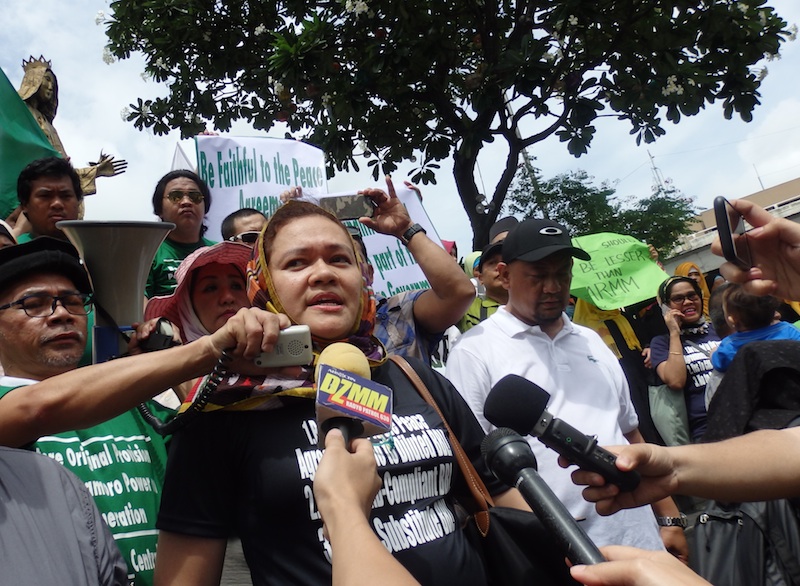 Civil society leader Fatima Pir Allian responds to reporters’ questions during an interfaith gathering dubbed “Pagtitipon sa EDSA para sa Bangsamoro” at the EDSA Shrine on July 11, 2018 to urge the Bicameral Conference Committee of Congress to pass a law that complies with the 2014 Comprehensive Agreement on the Bangsamoro. MindaNews photo by CAROLYN O. ARGUILLAS
Civil society leader Fatima Pir Allian responds to reporters’ questions during an interfaith gathering dubbed “Pagtitipon sa EDSA para sa Bangsamoro” at the EDSA Shrine on July 11, 2018 to urge the Bicameral Conference Committee of Congress to pass a law that complies with the 2014 Comprehensive Agreement on the Bangsamoro. MindaNews photo by CAROLYN O. ARGUILLAS
In the Cordaid and WO=MEN policy brief in September 2010 titled “Gender-responsive Peace and State-building Transforming the Culture of Power in Fragile States,” Yoka Brandt, former Dutch Ambassador to Uganda and Director-General of the International Cooperation at the Dutch Ministry of Foreign Affairs was quoted as saying that when women are actively involved, “peace agreements are more credible and cover a broader range of issues.”
“Their participation widens negotiations beyond issues of military action, power, and wealth sharing, and promotes a non-competitive negotiating style and bridge-building between the negotiating parties,” she said. (Carolyn O. Arguillas / MindaNews)
(This piece is part of a series on Women in the Bangsamoro, produced by MindaNews with support from the Embassy of Canada)
READ ALSO
SPECIAL REPORT: The women in the Bangsamoro peace process: history, herstory
